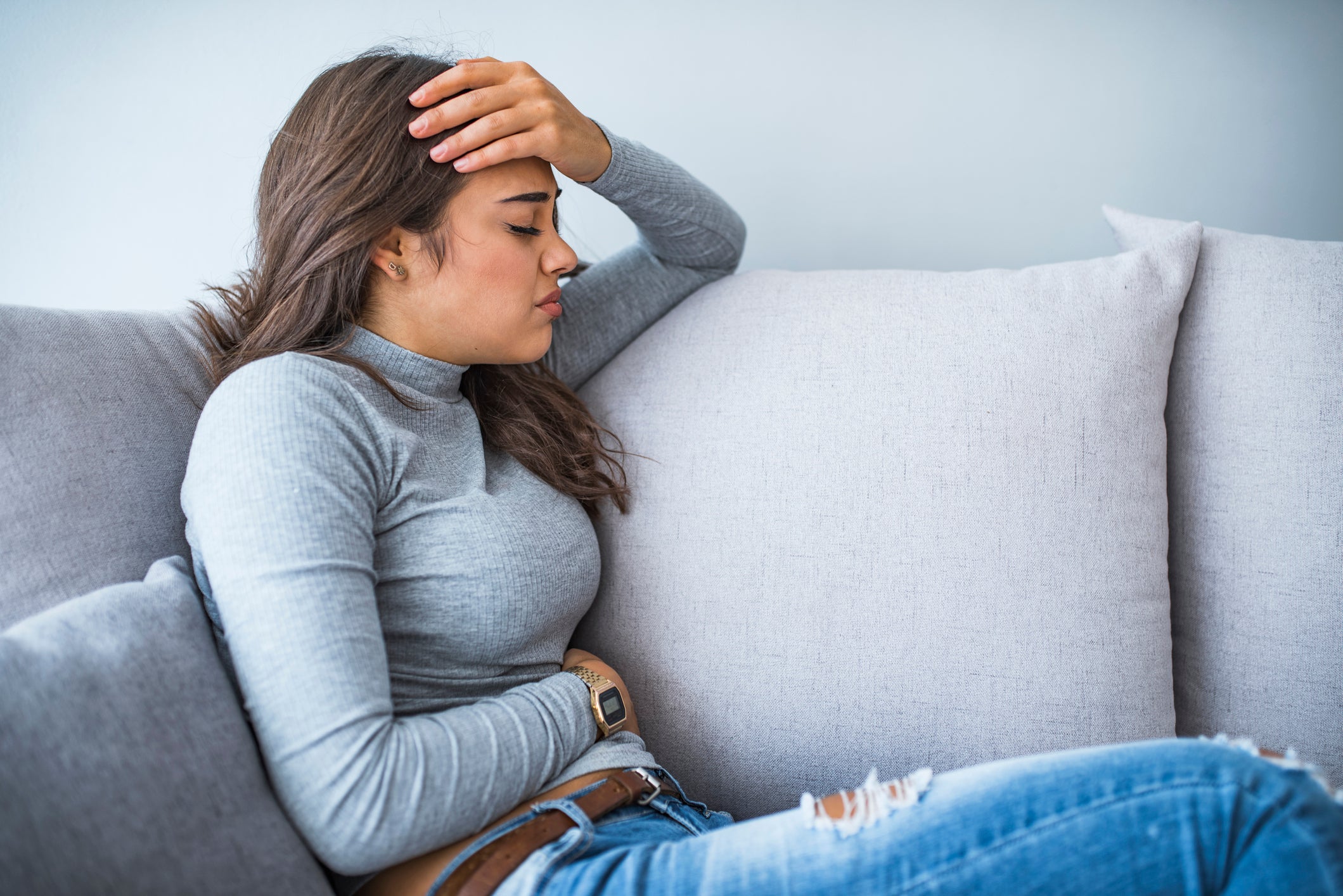There's nothing worse than settling into an intimate session with your partner, only to have pelvic pain flare unexpectedly. Instead of enjoying sex with your partner, you may find yourself struggling to get in the mood at all because you fear the possibility that pain will follow. Fortunately, you can minimize and even eventually cure pelvic pain during sex. First, make sure you're familiar with these key facts:
1. Pelvic pain during or after sex isn't normal.
If you're experiencing pelvic pain during or after sex, there may be a problem: sexually transmitted diseases, a urinary tract infection, vaginal infections, fibroids, endometriosis, and more. If you experience consistent pelvic pain during sex, talk frankly with your doctor as soon as possible. Thanks to modern advances in women's health, many sexual problems can be identified and treated, allowing you to enjoy sex with your partner again. If the pain has shown up suddenly, you may find that it can be resolved equally quickly: many infections, for example, can be cleared up in a few days with treatment.
2. You may need pelvic therapy.

If you're struggling with pelvic pain during sex, you may have other problems, as well: urinary incontinence, fecal incontinence, and even lack of sexual desire. Pelvic physical therapy focuses on relaxing the muscles around the pelvic area, often with both internal and external manipulation. When you relax the muscles around your pelvis, you may experience an immediate reduction in pain. By working with a physical therapist who specializes in pelvic manipulation, many women are able to experience a reduction in symptoms -- and that means a return to pain-free sex, greater sexual enjoyment, and even higher sex drive.
3. Vibration can help.
Many pelvic therapists use vaginal or rectal access to massage pelvic muscles. While it isn't a substitute for a physical therapist, who can help recommend exercises and stretches that can help decrease overall tension and relieve pain, vibration can go a long way toward alleviating pelvic pain. Not only does vibration help stimulate more of your nerves, which can lead to transmission of pleasure rather than pain, but it offers a great way to relax on your own! Choose a vibrator that offers direct and indirect stimulation. Ideally, you want a bendable vibrator like the CRESCENDO by MysteryVibe, which will allow you to manipulate the vibrator into exactly the position you need for maximum effect.
4. If there's not a physical reason, a sex therapist can help isolate and address your concerns.
In some cases, your doctor might not be able to diagnose a physical problem that has led to pelvic pain during sex. If you've ruled out any physical complications, anxiety or trauma could be to blame--but that doesn't mean that you have to live with the pain. Instead, contact a sex therapist, who may be able to recommend ways to work through many of the issues that could leave you struggling to fully enjoy sex. It may take a few visits to get the results you're hoping for, but ultimately, a sex therapist can help bring pleasure back to this core component of your relationships and your health.
5. Your sexual health and comfort matters.

Many women choose to ignore pain during sex, treating it as just "something to get through" or hoping that it will go away. Your sexual health, however, ties into many other aspects of your overall health, too. Regular sex--including enjoying it--can decrease anxiety, alleviate symptoms of depression, and relieve stress. Not only that, it can impact your physical health, too: when things are going well sexually, you're likely to have lower blood pressure and even an improved immune system. If you're struggling with pelvic pain during sex, it may quickly change more than just your relationship with your partner. Addressing those issues as soon as possible can help keep you more comfortable and prevent future suffering.
6. If you're struggling with pelvic pain during or after sex, there are things you can try to alleviate the symptoms.
Need to wait to get into your doctor's office, but find your sex drive flaring in spite of the potential for pain? Luckily, there are several things you can do while you're waiting for an appointment or waiting for pelvic therapy to take full effect. Try some of these strategies:
Change positions.
If you're struggling with pelvic pain, try finding a different position for intercourse. You may want a position that allows you more control: woman on top will give you the ability to shift position immediately or try something different if the pain starts to flare. Lying on your side can change the direction and extent of penetration, which may decrease pelvic pain. Communicate openly with your partner and let him know what's working and what isn't. Often, you can work together to create a more satisfactory experience.
Take things slowly.
When you're in the middle of a crazy sex session, it can be harder to slow things down--but when you're experiencing pelvic pain during sex, that may be exactly what you need to do. Take things slowly. Engage in plenty of foreplay, potentially including adding a vibrator to your foreplay to help increase arousal and relaxation of the pelvic muscles. Higher levels of arousal may decrease pain in general, making sex a more enjoyable experience again. Not only that, when you take things slow, you give your pelvic muscles more time to relax, which can decrease the odds of pain. If you're struggling with pelvic pain, a quickie--especially one with deep penetration or intense thrusting--could be an immediate turnoff. For the time being, wait to have sex until you have time to slow things down and enjoy.
Keep note of what triggers pelvic pain.
Pelvic pain can be unpredictable. Sometimes, you might not be sure what sets it off, especially if it seems to occur after sex. Other times, you may notice that certain positions are more likely to trigger it. As you're working to address your pelvic pain, take notes of what seems to trigger it and what doesn't. Make sure to communicate that information with your partner, who can then help you avoid positions or activities that seem more likely to trigger pelvic pain.
Experiment.
What works for someone else may not necessarily work for you when it comes to avoiding pelvic pain during sex, just like it does in other areas of the bedroom. You may be tempted to forego sex altogether while you wait for a solution. Sometimes, however, giving up sex just isn't an option--or you don't want it to be! During this time, experiment with some other options. Get creative! Talk with your partner and take the opportunity to explore some of the things you've always wanted to try together, but just haven't had a chance to get into. You may be surprised by what works and what doesn't. This is a great time to experiment with:
- Using a vibrator. If you've always wanted to try one and never gotten around to it, or if you've been thinking about trying a new style, now is a great time to make the investment.
- Oral sex. Because it doesn't involve internal penetration, oral sex can be extremely gratifying when you're struggling with pelvic pain. Make sure to reciprocate for your partner!
- New positions. It might not be a great time to try out every position in the book, but it is an excellent time to experiment with new positions, especially those that involve shallower penetration.
- Erotic massage. Because pelvic pain often comes from tight pelvic muscles, erotic massage can help you relax while heightening sexual tension: a fantastic combination that can decrease pain and make the experience more enjoyable for both of you.
7. Fear of pain can make things worse.
If you're anticipating pain during sex, you may accidentally make that pain worse. When you're anxious--including anxiety about pain--you're more likely to tense up, which can, in turn, increase the odds that sex will hurt--not to mention putting a damper on your overall arousal. If you're struggling with fear of pelvic pain during intercourse, it's important to take time to relax. You may need a few solo sessions--either with manual stimulation or with a vibrator--to help put yourself back in the mood and increase your anticipation of sex again. With the MysteryVibe CRESCENDO, you can simply lay back, enjoy, and appreciate sexual stimulation again, often without triggering the pain you fear.
If you're struggling with painful intercourse for any reason, consult a doctor as soon as possible to start reducing that pain and improving your overall sexual satisfaction. If you're looking for a great vibrator that can help you increase sexual enjoyment, decrease tension, and improve your pleasure, check out MysteryVibe to learn more about CRESCENDO, their bendable smart vibrator for women, men, and couples--and feel free to contact the MysteryVibe team to learn more about the range of available options or to ask any questions you have about their vibrators.















































